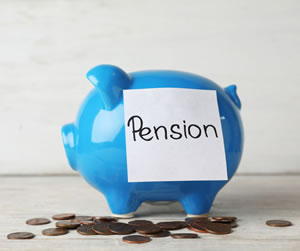Pensions and Retirement Financial Adviser
Pensions are designed to help you to save sufficient money from your income during your working life to provide an income stream for you to live on comfortably after you have retired.
There are many different ways to save for retirement, and the taxation and investment elements of pensions can appear baffling and off-putting. As a pensions financial adviser, we specialise in explaining, recommending and monitoring pensions for you.
The Retirement Planning Process

Saving for retirement is a long-term process, with it taking many years to build up a big enough retirement pot. One that will not only provide income (perhaps through Flexi Access Drawdown or an Annuity) but also a Tax-Free Lump Sum payment. pension funds can be used to provide some additional retirement income, over and above the meagre pension benefits provided by the State Pension.
The State Pension may not produce the same level of income that you will have been accustomed to whilst working. It is therefore important to start thinking early about how best to build up an additional retirement fund. You are never too young to start a pension - the longer you delay, the more you will have to pay both regularly and cumulatively in order to build up a decent fund for later life.
Choosing which of the many investment strategies to use, such as investing in the stock market are not the only issues you have to consider. There is also the matter of ensuring your investments are diversified and that your tolerance to risk is fully taken into account and regularly revisited as you move towards retirement. Human nature is to become more risk adverse as we grow older and your investments must reflect this.
This process takes care, knowledge and often difficult decisions have to be made.
The State Pension may simply not be enough
The State Pension may not produce the same level of income that you will have been accustomed to whilst working. It is therefore important to start thinking early about how best to build up an additional retirement fund.
What are Pension Drawdown and Annuities?
Drawdown is an all-encompassing word to describe the withdrawal of Lump Sums and/or income from funds which remain invested.
Annuities come with many different features but should broadly be thought of as the provision of a fixed income for a fixed term or until death in exchange for a lump sum non-refundable payment.
It is beyond the scope of this website to identify and discuss all the available options but Pension Review Services will be happy to do so when approached.
Your Financial Future is Safe in Our Hands
This is just what Pension Review Services provides. As independent financial advisers, our sole aim is to provide you with the very best financial planning and investment advice, something we do from taking a truly holistic approach, all starting with the complimentary free telephone / digital consultation.
Estate Planning Options Built In

Pension plans are very flexible, and it is easy to select just how you take your money out in the future, as well as being able to pass it all on to your successors when you die, this is increasingly being seen as being an essential part of Estate Planning, since monies held within a pension plan at the date of death do not form part of the deceased's estate for Inheritance Tax purposes.
If this idea appeals, we would be happy to discuss the benefits with you, but as you would expect there are the necessary pension regulations and laws to follow.
This is another reason using professional advisers to assist in the choice of investments as well as taking care of the administration tasks is in your interest.
So Many Ways to Draw on Your Pension Pot When You Have Retired
When planning for your retirement, you have also to consider the manner in which you are going to take money out of the ‘Pension Pot' and your other assets which have accumulated.
Even here things are not straightforward. For instance, you may want to use the ‘drawdown' method, but not all pension funds allow this. That in turn means the selection of your pension product and underlying investment funds needs to be carefully considered.
On the other hand, you may wish to buy an annuity. Again, this is not something to rush into. The market for these is changing all the time, so you really do need to talk to an expert.
We Understand the Pensions Market Place as Well as Your Personal Needs
At Pension Review Services we understand the complexities of the investment and pensions marketplace, and after our free, initial consultation with you, we will understand just what you need as well.
Then we can create just the right 'package' for you, thus helping to secure your financial future.
Information on the most common sources of pension income are detailed below
Single Tier State Pension
The new State Pension is a regular payment from the government that you can claim if you have reached State Pension Age (SPA) on or after 6 April 2016. Other arrangements applied prior to that date. You'll be able to get the new State Pension if you are eligible and:
If you reached State Pension age before 6 April 2016, you'd get the State Pension under the Basic State Pension and Additional State benefits headers as shown below.
The full new State Pension is £203.85 per week (2023/2024 tax year). Your National Insurance record is used to calculate your new State Pension. You'll usually need 10 qualifying years to get any new State Pension, 35 qualifying years for the full amount.
The amount you get can be higher or lower depending on your National Insurance record.
The basic State Pension applies to people whose State Pension Age falls before 6th April 2016, for people who have paid sufficient National Insurance Contributions while at work or have been credited with enough contributions. **
Additional State Pension (as above) - referred to as the State Second Pension (S2P) but before 6 April 2002, it was known as the State Earnings Related Pension Scheme (SERPS). From 6 April 2002, S2P was reformed to provide a more generous additional State Pension for low and moderate earners, carers and people with a long-term illness or disability and is based upon earnings on which standard rate Class 1 National Insurance Contributions are paid or treated as having been paid. Additional State Pension is not available in respect of self-employed income.

From April 2016, both the basic State Pension and Additional State Pension were combined to offer a simple single tier flat rate pension. **
An occupational pension (through an employer's pension scheme) - This could be a final salary scheme (referred to as defined benefit) or a money purchase scheme (usually referred to as defined contribution). Pensions deriving from final salary schemes are usually based on your years of service and final salary multiplied by an accrual rate, commonly 60ths. The benefits from a money purchase scheme are based on the amount of contributions paid in and how well the investments in the scheme perform.
Personal pensions schemes (including stakeholder schemes) - these are also money purchase schemes and are open to everyone and especially useful if you are self-employed, just for topping up existing arrangements. From October 2012, all employers now have to offer their employees, who meet certain criteria, automatic enrolment into a workplace pension.
Retirement Options - there are now a vast array of different products that may be used at retirement to provide benefits, from the traditional form of annuity that provides a regular income stream to Flexi-Access Drawdown which enables income to be taken either as a one-off payment or over a given number of years. Given the complexity and choice all individuals now have, it is important to seek independent financial advice before making any decisions.
** For those who have reached State Pension Age on or after 6th April 2016, these no longer apply.
The Financial Conduct Authority does not regulate taxation advice.
Pensions are a long-term investment. You may get back less than you put in. Pensions can be and are subject to tax and regulatory change; therefore, the tax treatment of pension benefits can and may change in the future.
